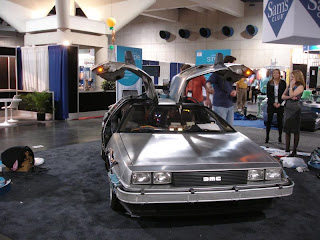 I am "attending" the 2010 National Real Estate CyberConvention and Exposition. For those who don't know, this great trade show all takes place online--you can network in your pajamas. This is my fourth day (the convention started on Sunday) and I have a few thoughts on "cyber" forums:
I am "attending" the 2010 National Real Estate CyberConvention and Exposition. For those who don't know, this great trade show all takes place online--you can network in your pajamas. This is my fourth day (the convention started on Sunday) and I have a few thoughts on "cyber" forums:
1. Information is easier to digest with an online convention. At a normal trade show or conference, you get barraged by so much information, nothing really seeps in. Everyone is vying for your attention, handing out promotional fliers and pens and stress balls (makes sense). With an online convention, you can access all the information at your leisure and you can easily sift through the vendors, allowing you to gravitate towards those that resonate with you and skip the ones that may not be what you need.
2. Speaker presentations sink in better online. A presenter may be miked at a regular convention, but you're still surrounded by a hub bub of activity, and a lot of what is presented may not sink in. Even if you're just making some talking points to a colleague, you're still missing some of the presentation. Not actively listening and trying to get something out of a presentation is like eating without digesting. It won't help you. With an online presentation, however, you can put on your headphones and actively listen to a presentation without missing anything. And, if you do miss something, you can always pause, rewind and playback. It really does allow the information to be more easily digested.
3. Online forums cannot replace human interaction. This was something I wasn't expecting, although I'm not too surprised by it. While I've "met" some great people at the online conference, I can't say that I've had a decent conversation. That's because no matter the technology - be it telephone, fax, or the Internet - nothing we invent will ever be able to replace actual human conversation, face to face. George Lucas was in a recent interview on Fresh Air. He was asked if he thought that movie theaters would ever become obsolete as more and more home theaters are built. He didn't think so.
"Look, he said, "as long as Green Bay Packer fans go in the 70 below zero weather, in the snow, to watch a game they can't actually see, because they all want to be together and scream together and have a good time together, the movie industry is safe. There will always be people who want that social experience, because human beings are a social animal."
The real estate industry is obviously changing, paperless transactions will be a part of its future, but so will the agents. Because buying and selling a home is an emotional experience and requires human connection, something that can't easily be replicated by ones and zeros.
If you have a chance, check out DotLoop CEO Austin Allison's take on how collaboration is the new competition here.






















